REPORTS FROM VARIOUS USERS OF MOTORVANS.
Page 15
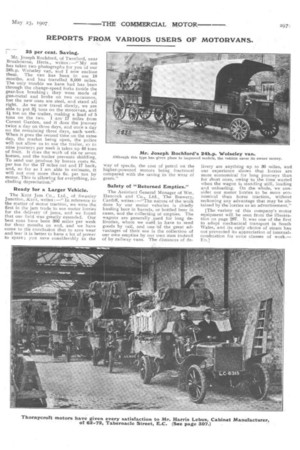
Page 16
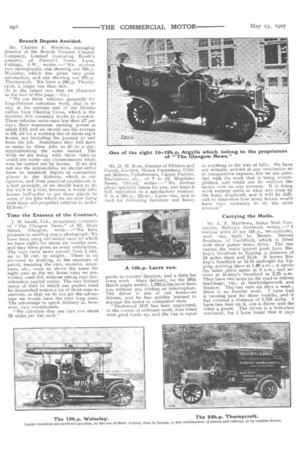
Page 17
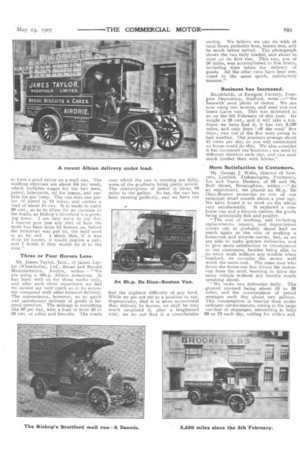
Page 18
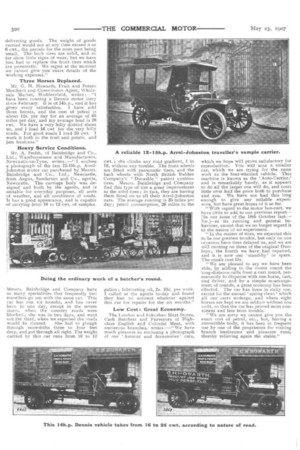
Page 19
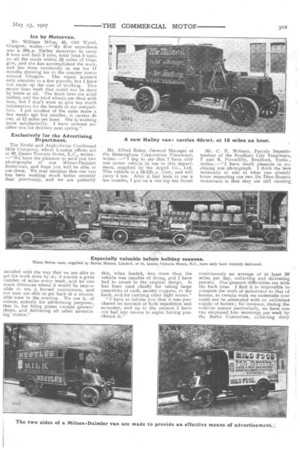
Page 20
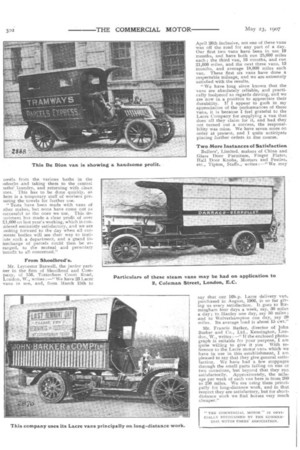
Page 23
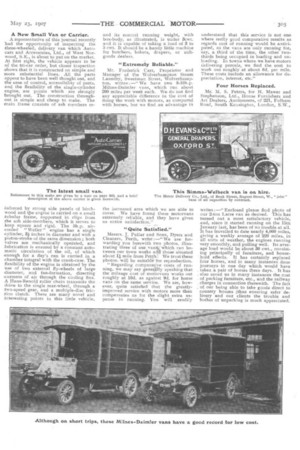
Page 24
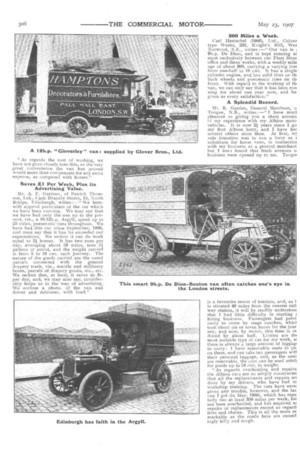
Page 25
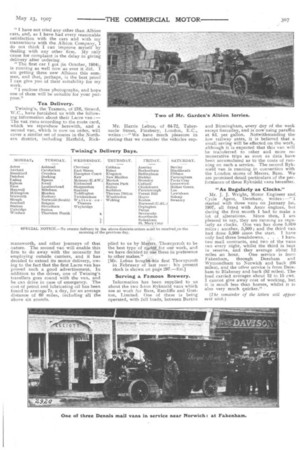
If you've noticed an error in this article please click here to report it so we can fix it.
25 per cent. Saving.
Mr. Joseph Rochford, of Turn ford, near Broxbourne, Herts., writes :—" My son has taken two photographs for you of our 24h.p. Wolseley van, and I now enclose them. The van has been in use 18 months, and has travelled 8,000 miles. The only trouble we have had has been through the change-speed forks inside the gear-box breaking ; they were made of gun-metal and broke on two occasions, but the new ones are steel, and stand all right. As we now travel slowly, we are able to put 31-tons on the motorvan, and ton on the trailer, making a load of tons on the two. I am 17 miles from Covent Garden, and it does the journey twice a day on three days, and once a day on the remaining three days, each week. When it goes the second time on the same day, the market being open, the police will not allow us to use the trailer, so in nine journeys per week it takes up 40 tons of fruit. It does the work of six or seven horses, and the trailer prevents skidding. To send our produce by horses costs 8s. per ton for the 17 miles out and 17 back, and, so far as I am able to estimate, it will not cost more than 6s. per ton by motor. This is allowing for everything, including depreciation."
Ready for a Larger Vehicle.
The Kent Jam Co., Ltd., of Swanley Junction, Kent, writes :—" In reference to the matter of motor traction, we were the first in the jam trade to use motor lorries for the delivery of jams, and we found that our field was greatly extended. Our best runs have been 300 miles per week for three months on end, and we have come to the conclusion that to save wear and tear it is better to have a lot of power to spare ; you save considerably in the way of spetds, the cost of petrol on the higher-powered motors being fractional compared with the saving in the wear of gears."
Safety of "Returned Empties."
The Assistant General Manager of Wm. Hancock and Co., Ltd., The Brewery, Cardiff, writes :—"The nature of the work done by our motor vehicles is chiefly hauling beer in barrels, or bottled beer in cases, and the collecting of empties. The wagons are generally used for long deliveries, where we used to have to send goods by rail, and one of the great advantages of their use is the collection of our own empties by our own men instead of by railway vans. The distances of de
livery are anything up to 30 miles, and our experience shows that lorries are more economical for long journeys than for short ones, owing to the time wasted when the wagon is standing still, loading and unloading. On the whole, we consider our motor lorries to be more economical than horse traction, without reckoning any advantage that may be obtained by the lorries as an advertisement."
[The variety of this company's motor ecliiipment will be seen from the illustration on page 287. It was one of the first to adopt mechanical transport in South Wales, and, its. early choice of steam has not prevented its appreciation of internalcombustion for some classes of work.— En.] Branch Depots Avoided.
Mr. Charles F. Hitnhins, managing director of the British Vacuum Cleaner Company, Limited (operating Booth's patents), of Parson's Green Lane, Fulham, S.W., writes :—" We enclose two photographs, one showing our 12h.p. Wolseley, which has given very great satisfaction, and one showing our 20h.p. Thornycroft. We have a 24h.p. Thornycroft, a larger one than this.
[It is the larger one that we illustrate at the foot of this page.—En.] "We use these vehicles generally for long-distance suburban work, that is to say, at the extreme end of the 15-mile radius from Charing Cross, which is the territory this company works in London. These vehicles never earn less than £7 per day; their maximum earning power is about £12, and we should say the average is £8, all for a working day of about eigat hours, not including the journey to and from the job. Sometimes they will have as many as three jobs to do in a day, approximating the sums named. The work we are doing with these vehic'es could not under any circumstances whatever be carried out by horses. If we did not use the automobiles we should either have to establish depots at convenient places in the districts, which in our opinion, and from practical experience, is a bad principle, or we should have to do the work at a loss, because it would take horses half-a-day to get these plants to some of the jobs which we are now doing with these self-propelled vehicles in under 1.1 hour."
'rime the Essence of the Contract.
J. M. Smith, Ltd., proprietary company of "The Glasgow News," of 67, Hope Street, Glasgow, write :—" We have pleasure in sending you a photograph. We have been using our motor. vans (of which we have eight) for about six months now, and they have given us every satisfaction. The vans carry news parcels from 1 cwt. up to 12 cwt. in weight. There is no economy in working, as the expenses of petrol, manning the cars, up-keep, insurance, etc., costs us about the same for eight cars as the ten horse vans we previously used did, without taking into consideration capital outlay. The very limited space of time in which our papers must be despatched makes a lot of short runs to stations, so that we do not get the advantage we would were the runs long ones. The advantage in quick delivery is, however, very considerable.
"We calculate that our cars run about 25 miles per day each." Mr. D. M. Rose, director of Elliston and Cavell, Limited, House Furnishers, Cabinet Makers, Upholsterers, Carpet Factors, Decorators, etc., of 7 to 12, Magdalen Street, Oxford, writes :—" We enclose photo specially taken for you, and hope it will reproduce in a satisfactory manner. It is a 16h.p., 24cwt., Lacre van, and is used for delivering furniture and heavy goods in country "districts, and a little for town work. Since delivery, on the 20th March (eight weeks), 1,792 miles have been run without any mishap or interruption. The driver is one of our horse-van drivers, and he has quickly learned to manage the motor in competent style. " Dashwood Hill has been negotiated, in the course of ordinary work, four times with good loads up, and the van is equal to anything in the way of hills. We have not actually arrived at any conclusion as to comparative expense, but we are satis-. fed with the work that is being accomplished, and could not do without the motor now on any account. It is doing work entirely extra to what was done by the horse displaced, and it will be difficult to determine how many horses would have been necessary to do the same amount.''
Carrying the Mails.
Mr. L. F. Matthews, Motor Mail Contractor, Bishop's Stortford, writes :—" I enclose print of my 14.h.p., two-cylinder, mail van, built by Messrs. Dennis Brothers, of Guildford, which 'is fitted with their patent worm drive. The van carries the mails (parcel post) from Bishop's Stortford to Epping, a distance of 24 miles there and back. It leaves Bishop's Stortford at 12.15 midnight for Epping, arriving there at 1.30 a.m.; it leaves the latter place again at 2 a.m., and arrives at Bishop's Stortford at 3.25 a.m. They have two stops on the road to deliver mail-bags, viz., at Sawbridgeworth and Harlow. The. van runs six days a week ; there is no Sunday work. I have had it running now for three months, and it has covered a distance of 1,728 miles. I have two men on it, one a driver and the other a guard. The driver is a first-class mechanic, for I have found that it pays
to have a good driver on a mail van. The working expenses are about £4 per week, which includes wages for the two men, petrol, lubricants, oil for lamps, and carbide for gas lamp. The van uses one gallon of petrol to 12 miles, and carries a load of about 15 cwt. It is made to carry 30 cwt., so as to allow for an increase in the mails, as Bishop's Stortford is a growing town. I am very sorry to say that I cannot give you any idea of how the work has been done by horses, as, before the motorvan was put on, the mail used to go by rail. I think that, if it was done by Lorses, it would require a pair, and I doubt if they would do it in the time."
Three or Four Horses Less.
Mr. James Taylor, Junr., of James Taylor (Wheatho1m), Ltd., Bread and Biscuit Manufacturers, Airdrie, writes :—" We are using a 16h.p. Albion motorvan. It has been with us for three weeks only, and after such short experience we feel we cannot say very much as to its economy compared with other forms of delivery. The convenience, however, as to quick and satisfactory delivery of goods is beyond question. The mileage is something like 50 per day, with a load of from 20 to 24 cwt. of cakes and biscuits. The roads
over which the van is running are hilly, some of the gradients being pretty severe. The consumption of petrol is about 10 miles to the gallon. So far, the van has been running perfectly, and we have not had the slightest difficulty of any kind. While we are not yet in a position to say, dogmatically, that it is more economical than delivery by horses, we shall be very much surprised if, after a lengthened trial, we do not find it a considerable saving. We believe we can do with at least three, probably four, horses less, and be much better served. The photograph shows the van fully loaded, and about to start on its first run. This run, one of 50 miles, was accomplished in five hours, including time taken for delivery of goods. All the other runs have been executed in the same quick, satisfactory manner."
Business has Increased.
Brookfields, of Eastgate Factory, Foregate Depository, Stafford, write :—" We herewith send photo of motor. We are now using two motors, and send you our latest Lacre van. This was delivered to us on the 5th February of this year. Its weight is 28 cwt., and it will take a ton. Since, we have had it, it has run 3,530 miles, and only he-en 'off the road' five days; two out of the five were owing to bad weather. Our journeys average about 45 miles per day, so you will understand no horse-could do -this. We also consider it has increased our business ; we send to different districts each day, and can send much further than with horses."
More Satisfaction to Customers.
Mr. George J. Wake, director of Sawyers, • Limited, Fishmongers, Poulterers, Ice and Game Dealers, of 83 and 84, Bull Street, Birmingham, writes :—" As an experiment, we placed an 8h.p. De Dion-Bouton motorvan on one of our principal retail rounds about a year ago. We have found it to work on the whole very satisfactorily. It replaced a onehorse van and a tricycle carrier, the goods being principally fish and poultry.
"The cost of working, and including replacements, repairs, and depreciation comes out at probably about half as much again as the cost of working a horse-van and tricycle carrier, but, as we are able to make quicker deliveries, and to give more satisfaction in consequence to our customers, besides being able to do extra work without any trouble when "required, we consider the motor well worth the extra cost. The same man who drove the horse-van has driven the motorvan from the start, learning to drive the latter vehicle without any trouble worth speaking about.
We make two deliveries daily. The ground covered being about 25 to 30 miles, and the consumption of petrol averages each day about two gallons. This consumption is heavier than under ordinary circumstances, owing to the large number of stoppages, amounting to fully 60 or 70 each day, calling for orders and delivering goods. The weight of goods carried would not at any time exceed a or cwt., the parcels for the most part being small. The back tires are solid, and so far show little signs of wear, but we have just had to replace the front tires which are pneumatic. We regret at the moment we cannot give you exact details of the working expenses."
Three Horses Replaced.
Mr. G. H. Howarth, Fruit and Potato Merchant and Commission Agent, Wholesale Market, Huddersfield, writes have been running a Dennis motor lorry since February. It is of 14h.p., and it has given every satisfaction. I have sold three horses, and the cost of petrol is about 12s. per day for an average of 65 miles per day, and my average load is 20 cwt. We have a very hilly district about us, and I load 16 cwt for the very hilly roads. For good roads I load 25 cwt. I work it both in the fruit and potato. and jam business."
Heavy Service Conditions.
Mr. A. Smith, of Bainbridge and Co., Ltd., Warehousemen and Manufacturers, Newcastle-on-Tyne, writes :—" I enclose a photograph of the last 12-15h.p. ArrolJohnston motor car purchased by Messrs.
• Bainbridge and Co., Ltd., Newcastle, from Angus, Sanderson and Co., agents, Newcastle. The carriage body was designed and built by the agents, and is suitable for everyday purposes, all sorts of weather, and all conditions of roads. It has a good appearance, and is capable of carrying from 10 to 12 cwt. of samples.
Messrs. Bainbridge and Company have so many specialities that frequently two travellers go out with the same ear. This car has run six months, and has never been in one day, except in the severe storm, when the country roads were blocked t she was in two days, and went cut the third, when we expected the roads would be cleared. She had to plough through snowdrifts three to four feet deep, and got through all right. The weight carried by this car runs from 10 to 12
cwt. ; she climbs any road gradient, I in 10, without any trouble. The front wheels are fitted with pneumatic tires, and the back wheels with North British Rubber Company's "Ducasble " patent cushion tires. Messrs. Bainbridge and Company find this type of tire a great improvement to the solid tires ; in fact, they are baying them fitted on to all their Arrcl-johnston cars. The average running is 35 miles per day ; petrol consumption, 26 miles to the gallon ; lubricating oil, 2s. 10c1, per ,,veek. I called at the agents to-day and found they had no account whatever against this car for repairs for the six months."
Low Cost: Great Economy.
The London and Suburban. Meat Stores, Cash Butchers and Purveyors of Highclass English and Colonial Meat, with numerous branches, writes :—" We have much pleasure in enclosing a photograph of our Autocar and Accessories ' cars, which we hope will prove satisfactory for reproduction. You will note a smaller car, which we are trying for the same work as the four-wheeled vehicle. This machine is known as the Auto-Carrier,' and is remarkably handy, as it appears to do all the larger one will do, and costs little over half the price both to purchase and run. We have not had this long enough to give any reliable experience, hut have great hopes of it so far.
With regard to the motor box-cart, we have little to add to our previous report— [In our issue of the 18th October last.ED.]—re its running and general behaviour, except that we DO longer regard it in the nature of an experiment.
" In the matter of tires, we expected this to be our greatest trouble, but only on one occasion have tires delayed us, and we are still running on three of the original Dunlops ; the fourth we have had repaired, and it is now our 'stand-by ' or spare. The repair cost 15s.
We are pleased to say we have been able, by adding to the motor round the long-distance calls from a cart round, permanently to dispense with one horse, cart, and driver, and by a simple re-arrangement of rounds, a great economy has been effected. The car has been in daily use, except for the annual 'spring clean' which all our carts undergo, and where eight horses are kept we are seldom without one unfit, so that the car has proved most consistent and free from trouble.
"We are sorry we cannot give you the exact cost of petrol, etc., but, having a convertible body, it has beers in frequent use by one of the proprietors for visiting branch businesses and pleasure runs, thereby relieving again the stable."
Ice by Motorvan.
Mr. William Milne, 40, Old Wynd, Glasgow, writes :—" My first experience was a 2811.p. Halley rnotorvan to carry 3 tuns and trail 2 tons, total load 5 tons, on all the roads within 25 miles of Glasgow, and she has accomplished the work, and has been constantly in use for 11 months drawing ice to the country towns around Glasgow. The repair account only amounts to a few pounds, but I have not made up the cost of working. This motor does work that could not be done by horse at all. The front tires are solid rubber, and the hind wheels are shod with iron, but I don't want to give too much information for the benefit of my competitors. I got another of the same make a few weeks ago but smaller, it carries 45 cwt. at 12 miles per hour. She is working quite satisfactorily. I have ordered another one for delivery next spring."
Exclusively For the Advertising D2partment.
The Nestle and Anglo-Swiss Condensed Milk Company, whose London offices are at 49, Queen Victoria Street, E.C., writes: —"We have the pleasure to send you two photographs of our Milnes-D.aimler motor-van, and hope you will be able to use these. We may mention that our van has been working much better recently than previously, and we are perfectly
satisfied with the way that we are able to get the work done by it ; it travels a great number of miles every week, and we can reach distances where it would be impcssible to use a horsed conveyance, and our men are able to get back at a reasonable time in the evening. We use it, of course, entirely for advertising purposes, that is, for fixing plates outside grocers' shops, and delivering all other advertising matter." Mr. Alfred Baker, General Manager of the Birmingham Corporation Tramways, writes :—" I beg to say that T have only one motor vehicle in use in this departmerit, supplied by the ArgyllCo., Ltd. This vehicle is a 10-12h.p. lorry, and will carry 1 ton. After it had been in use a few months, I put on a van top but found this, when loaded, was more than the vehicle was capable of doing, and I have had to revert to the original design. It has been used chiefly for taking large quantities of cash, mostly coppers, to the bank, and for carrying other light stores."
"I have to inform you that it was purchased on account of both expedition and economy, and up to the present I have not had any reason to regret having purchased it." Mr. C. E. Hobson, Parcels Superintendent of the Bradford City Tramways, 7 and 9, Piccadilly, Bradford, Yorks., writes :—" I have much", pleasure in enclosing you photograph. I think the best testimony to add to what you already know respecting our two De Dion-Bouton motorvans is that they are still running,
continuously an average of at least 30 miles per day, collecting and delivering parcels. Our greatest difficulties are with the back tires. I find it is impossible to compare the work of motorvans to that of horses, as certain work we undertake now: could not be attempted with an unlimitedl supply of horses ; for instance, during the summer season particularly, we have onevan employed four mornings per week by the Baths Committee, collecting dirty
owe's. from the various baths in the nibutbs and taking them to the central )aths laundry, and returning with clean mes. This has to be done quickly, as here is a temporary staff of workers preyaring the towels for further use.
" Tests have been made with vans of yther makes, hut none have come out as mccessful as the ones we use. This deyartment has made a clear profit of over C1,000 on last year's working, which is con3idered eminently satisfactory, and we are .o.oking forward to the day when all cur?orate bodies will see their way to institute such a department, and a grand interchange of parcels could then be arranged, to the mutual and pecuniary benefit to all -concerned."
From Shoolbred's.
Mr. Leycester Barwell, the junior partner in the firm of Shoolbred and Company, of 156, Tottenham Court Road, London, W., writes:—' We have 23 Lacre vans in use, and, from March 15th to April 26th inclusive, not one of these vans was off the road for any part of a day. Our first two vans have been in use 19 months, and have both run 25,000 miles each ; the third van, 16 months, and run 21,000 miles, and the next three vans, 13 months, and average 18,000 miles each van. These first six vans have done a respectable mileage, and we are extremely satisfied with the results.
"We have long since known that the vans are absolutely reliable, and practically foolproof as regards driving, and we are now in a position to appreciate their durability. If I appear to gush in my appreciation of the performances of these vans, it is because I feel grateful to the Lacre Company for supplying a van that doesall they claim for it, and had they not turned out a success, the responsibility was mine. We have seven more on order at present, and I quite anticipate placing further orders in due course.
Two More Instances of Satisfaction
Bullers', Limited, makers of China and Glass Door Furniture, Finger Plates, Hall Door Knobs, Mortars and Pestles, etc., Tipton, Staffs., writes :—" We may
say that our 16h.p. Lacre delivery van, purchased in August, 1906, is so far giving us every satisfaction. It goes to Birmingham four days a week, say, 30 miles a day; to Hanleyone day, say 50 miles ; and to Wolverhampton one day, say 20 miles. Its average load is about 15 cwt."
Mr. Francis Barker, director of John Barker and Co., Ltd., Kensington, London, W., writes :—" If the enclosed photograph is suitable for your purpose, I am quite willing to give it you With reference to the Lacre motor vans which we have in use in this establishment, I am pleased to say that they give general satisfaction. We have had a few stoppages through the small parts failing on one or two occasions, but beyond that they run satisfactorily. Approximately, the mileage per week of each van here is from 200 to 250 miles. We are using them principally for long-distance work, and in that respect they are satisfactory, but for short. distance work we find horses very much cheaper." A New Small Van or Carrier.
A representative of this journal recently had the opportunity of inspecting the three-wheeled, delivery van which Autocars and Accessories, Ltd., of West Norwood, S.H., is about to put on the market. At first sight, the vehicle appears to be of the tri-car order, but closer inspection shows that it is constructed on simple and more substantial lines. All the parts appear to have been well thought out, and the ease of control, accessibility of parts, and the flexibility of the single-cylinder engine, are points which are strongly brought out. The construction throughout is simple and cheap to make. The main frame consists of ash members re inforced by strong side panels of birchwood and the engine is carried on a small tubular frame, supported in clips from the ash side-members, which it serves to keep square and rigid. The 5h.p. aircooled "Weller" engine has a single cylinder, 3i inches in diameter and with a piston-stroke of the same dimension ; both valves are mechanically operated, and lubrication is ensured by a constant automatic circulation of the oil, of which enough for a day's run is carried in a chamber integral with the crank-case, The flexibility of the engine is obtained by the use of two external fly-wheels of large diameter, and fan-formation, directing 'currents of air through the cooling fins. A Hans-RenoId roller chain transmits the drive to the single rear-wheel, through a two-speed gear, and a multiple-disc friction clutch. There are many novel and interesting points in this little vehicle,
and its normal running weight, with box-body, as illustrated, is under &wt. and it is capable of taking a load of 3 to 5 cwt. It should be a handy little machine for butchers, bakers, drapers, or softgoods dealers.
"Extremely Reliable."
Mr. Frederick Carr, Proprietor and Manager of the Wolverhampton Steam Laundry, Sweetman Street, Wolverhamp ton, writes We have two 8-10h.p. 141ilnes-Daimler vans, which run about 200 miles per week each. We do not find any appreciable difference in the cost of doing the work with motors, as compared with horses, but we find an advantage in the increased area which we are able to cover. We have found these motorvans extremely reliable, and they have given us entire satisfaction."
"Quite Satisfied."
Messrs. J. Pullar and Sons, Dyers and Cleaners, Perth, write. :—" We are forwarding you herewith two photos. illustrating three of our vans c which run between our town works attl those situated about 11 mile from Perth. We trust these photos. will be suitable for reproduction.
"Regarding comparative costs of running, we may say ,generally speaking that the mileage cost of motorvans works out roughly at 10d. as against 9d, for horse vans on the same service. We are, however, quite satisfied that the greatlyimproved service with motors more than compensates us for the slight extra expense in running. You will readily
understand that this service is not one where really good comparative results as regards cost of running would be anticipated, as the vans are only running for, say, a third of the time, the other twothirds being occupied in loading and unloading. In towns where we have motors delivering parcels, we find the cost to work out roughly at about 8d. per mile. These costs include an allowance for depreciation, interest, etc."
Four Horses Replaced.
Mr, M. S. Peters, for H. Mawer and Stephenson, Ltd., House Furnishers and Art Dealers, Auctioneers, of 221, Fulham Road, South Kensington, London, S.W., writes :—" Enclosed please find photo of our 2-ton Lacre van as desired. This has turned out a most satisfactory vehicle, and, since it started running on the 15tri January last, has been of no trouble at all. It has travelled to date nearly 4,000 miles, giving a weekly average of 220 miles, in all sorts of weather, the engines running very smoothly, and pulling well. Its average load would be about 30 cwt., consisting principally of furniture, and household effects. It has certainly replaced four horses, and in many instances done journeys in one day which would have . taken a pair of horses three days. It has . also saved us in many instances the•cost of packing furniture, etc., and the railway • charges in connection therewith. The fact . of. our being able to take goods direct to country hduses •(thus ensuring safer• delivery and our clients the trouble and bother of unpacking is much appreciated. "As regards the cost of working, we have not gone closely into this, as the very great convenience the van has proved would more than compensate for any extra expense, as compared with horses."
Saves £1 Per Week, Plus its Advertising Value.
Mr. A. F. Gardner, of Patrick Thomson, Ltd., Cash Drapery Stores, 15, North Bridge, Edinburgh, writes :—" We herewith append particulars of the car which we have been running. We may say that we have had only the one up to the present, viz., a 10-12h.p. Argyll, speed up to 25 miles, pneumatic tires throughout. We have had this car since September, 1906, and must say that it has far exceeded our expectations. We reckon it can do work equal to 2i horses. It has two runs per day, averaging about 50 miles, uses 21 gallons of petrol, and the weight carried is from 5 to 10 cwt. each journey. The nature of the goods carried are the usual parcels connected with the general drapery trade, viz., mantle and millinery boxes, parcels of drapery goods, etc., etc. We reckon that, at least; it saves us 3s. per day, and, we may also say, considerably helps us in the way of advertising. We enclose a photo. of the van and driver and deliverer, with load." 300 Miles a Week.
Carl Hentschel (1906), T.td., Colour type Works, 232, Knight's Hill, Was . Norwood, S.E., writes :—" Our van is 9h,p, De Dion, and is kept running al most exclusively between our Fleet Strec office and these works, with a weekly mile age of about 300, carrying a varying loaf from one-half to 10 cwt. It has a single cylinder engine, and has solid tires on th. back wheels and pneumatic tires on th. front. With regard to the working of van, we can only say that it has been run fling for about one year now, and ha: given us every satisfaction."
A Splendid Record.
Mr. R. Garden, General Merchant, o Tongue, N.B., writes —"I have mudl pleasure in giving you a short accoun of my experience with my Albion mato: vehicles. It is now 24. years since I go my first Albion lorry, and I have hat several others since then. At first, sole intention was to run a lorry as substitute for horse vans, in connectica with my business as a general merchant but I sooa found that fresh avenues o business were opened up to me. Tongue is a favourite resort of tourists, and, as i is situated 40 miles from the nearest rail way station, it will be readily understoor that I had little difficulty in starting hiring business. business. Passengers had previ ously to come by stage coaches, whicl took about six or seven hours for the jour ney, and now, by motor, this time is re duced by about half. Lbrries are th4 most suitable type of car for my work, a: there is always a large amount of luggage to carry : I have removable seats to psi on these, and can take ten passengers will their personal luggage, and, as the seat: are removable, the cars can be used soIe1; for goods up to 24 cwt.. in weight. "As regards overhauling and repairs the Albion cars are so simply constructeC that all the replacements and repairs an done by my drivers, who have had lac workshop training. The cars have nave: given any trouble, however, and the las one I got (in May, lf)06), which has regu larly run at least 350 miles per week, hai not been overhauled, and has required nc repairs or replacements except as regard: tires and chains. This is all the more re markable as the roads here are exceed ingly hilly and rough. " I have not tried any other than Albion cars, and, as I have had every reasonable satisfaction with the cars and with my transactions with the Albion Company, I do not think I can improve myself by dealing with any other firm. My only cause for complaint is the delay in giving delivery after ordering. "The first car I got (in October' 1904), is running as well now as ever it did. I arn getting three new Albions this summer, and that, perhaps, is the best proof I can give you of their suitability for my work.
"I enclose three photographs, and hope one of them will be suitable for your purpose."
Tea Delivery.
Twining's, the Teamen, of 216, Strand, W.C., have furnished us with the following information about their Lacre van :— The var. runs according to the route card, which we reproduce herewith, and a second van, which is now on order, will cover a similar set of routes in the Northern district, including Hatfield, Rick mansworth, and other journeys of that nature. The second van will enable this firm to do away with the necessity for employing outside carriers, and it has decided to extend its motor delivery, owing to the fact that the first Lacre van has proved such a good advertisement. Iu addition to the driver, one of Twining's travellers goes round with the van, and he cart drive in case of emergency. The cost of petrol and lubricating oil has been found to average 7s. a day, for an average distance of 60 miles, including all the above six rounds. Mr. Harris Lebus, of 64-72, Tabernacle Street, Finsbury, London, E.C., writes We have much pleasure in stating that we consider the vehicles sup.
plied to us by Messrs. Thorny,croft to be the best type of raptor for our work, and we have decided to use these in preference to other makes."
[Mr. Lebus boughk–his first Thornycroft in February of last year his present stock is shown on page 297.—En.]
Serving a Famous Brewery.
Information has been supplied to us about the two 5-ton Ryknield vans which are at work for Bass, Ratcliffe and Gretton, Limited. One of these is being operated, with full loads, between Burton and Birmingham, every day of the week except Saturday, and is now using paraffin at 4d. per gallon. Notwithstanding the low railway rates, it is believed that a small saving will he effected on the work, although it is expected that this van will be transferred to other and more remunerative trips as soon as data have been accumulated as to the costs of running on such a service. The second Ryknield van is running in connection with the London stores of Messrs. Bass. We are promised detail particulars of the performance of these Ryknield vans hereafter.
"As Regularly as Clocks."
Mr. J. J. Wright, Motor Engineer and. Cycle Agent, Dereham, writes : —" I started with three vans on January 1st, 1907, all fitted with Aster engines., but during the first month I had to make a lot of alterations. Since then, I arts pleased to say, they are running as regularly as clocks, One van has done 5,01:11 miles ; another, 5,500; and the third van had done 5,900 since the start. I have only had three breakdowns. . . I havu two mail contracts, and two of the vans run every night, whilst the third is kept in reserve, and they average about 12 miles an hour. One service is from Eakenham, through Dereham and Wymondham to Norwich and back (66 miles), and the other service is from Dereham to Blakeney and back (52 miles), The load carried averages about 12 to 15 cwt. I cannot give away cost of working, but it is much less than horses, whilst it is also very much quicker."
(The remainder of the letters will appear next week.)






























